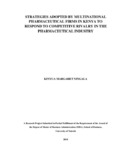| dc.description.abstract | Today‘s business environment requires firms to embed in relationships with other actors
in order to gain access to resources needed. In order to be successful, organizations must
be strategically aware. They must understand how changes in their competitive
environment are unfolding. They should actively look for opportunities to exploit their
strategic abilities, adapt and seek improvements in every area of the business, building on
awareness and understanding of current strategies and successes. Organizations must be
able to act quickly in response to opportunities and barriers. Organizations have to be
able to respond effectively to challenges, both problems and opportunities as they arise.
In response, organizations should work towards an outward-focused view of the way
services should be provided, a fundamental shift from the traditional focus on internal
concerns. At the same time, major opportunities for improvement may arise from
developments such as competitive environment, the changing taste of consumers and the
availability of additional financial resources. The objective of the study was to determine
the strategies adopted by multinational pharmaceutical firms in Kenya to respond to
competitive rivalry in the pharmaceutical industry. The research design adopted was
cross sectional survey. The population of the study comprised of all the 25 multinational
pharmaceutical firms operating in Kenya and thus the study was census. The study used
primary data which was collected using a questionnaire. The data was analyzed using
descriptive statistics. The study found that the firms responded to competitive rivalry in
the industry by adopting niche marketing, low cost and differentiation strategies.
Adoption of these strategies was based on identification of customer needs in order to
create customer loyalty, offer differentiated products that suit customer needs, undertake
aggressive advertisement and promotion, undertake market research, analyze
competitors‘ costs, before fixing prices and establishing relationship marketing. Other
strategies used include ensuring resources match growth in the need for products,
offering affordable and competitive products in all regions in the country, development of
diversified products so as to realize brand loyalty, offering low cost products in
comparison to competitors thus leading to improvement in market share, possession of
detailed knowledge and customer needs, continuous product improvement and
innovation, partnering with customers to produce highly customized products, increasing
advertising funds from one year to another than competitor and unique characteristics that
differentiates the company from competitors. The study concluded that the competition in
the pharmaceutical industry has resulted in the multinational companies adopting
different strategies that include differentiation, niche marketing, and low cost strategy in
order to compete effectively. The study recommends that the multinational firm should
inculcate a practice of continuous review of the state of competition in the industry,
implement processes to identify customer needs, produce innovative products, have a
good marketing budget, consider product pricing and adopt strategies that will ensure
achieving competitive advantage. | en_US |

